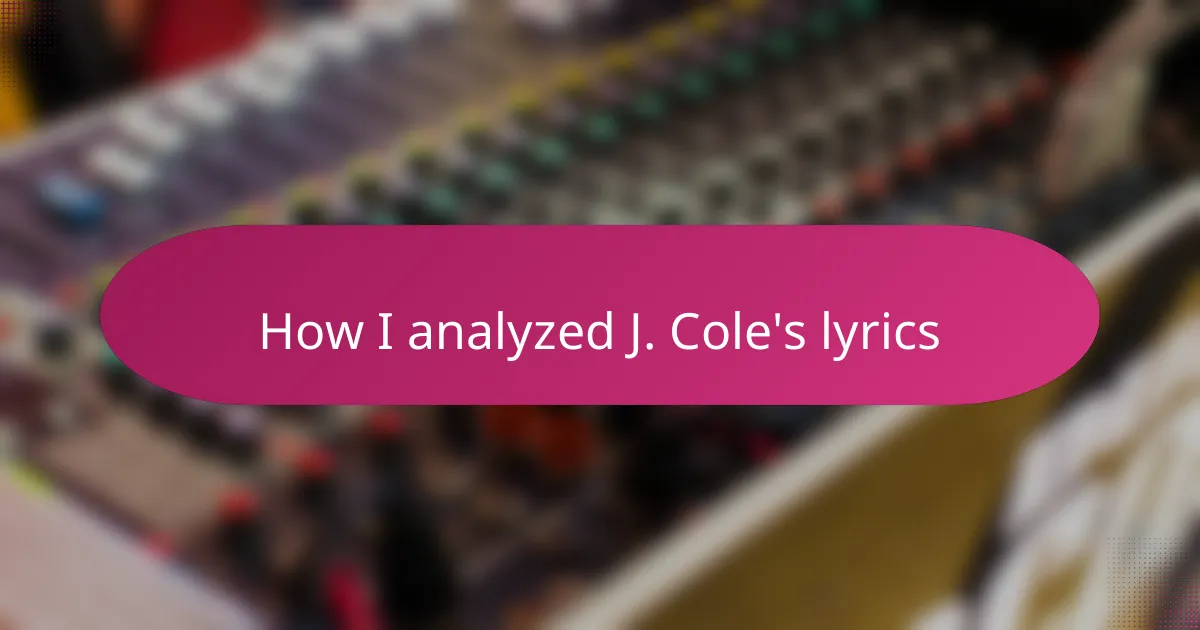Key takeaways
- Understanding rap lyrics involves decoding stories, emotions, and social commentary through metaphors and personal experiences.
- J. Cole’s style effectively combines storytelling and introspection, using vivid imagery and straightforward language to create relatable messages.
- Analyzing lyrics with tools like Genius.com and note-taking enhances the listening experience and uncovers deeper meanings.
- Recurring themes in J. Cole’s work reflect personal growth, social awareness, and the power of vulnerability, creating a meaningful connection with listeners.

Understanding Rap Music Lyrics
When I first started paying close attention to rap lyrics, I quickly realized that understanding them is not just about catching rhymes or catchy phrases. It’s about decoding stories, emotions, and social commentary woven into complex wordplay. Have you ever found yourself rewinding a verse because it felt like there was something deeper hiding beneath the surface? That’s exactly what happens when you truly engage with rap music.
In my experience, the richness of rap lyrics often reflects the artist’s personal struggles, triumphs, and worldview. It’s like flipping through the pages of a diary set to rhythm. I’ve sometimes felt a strong emotional connection to lines that echo my own experiences or challenge my perception of the world. This connection makes listening feel far more intimate and meaningful.
Understanding rap lyrics demands patience and focus because artists frequently use metaphors, slang, and layered references. I’ve found that looking up unfamiliar terms or background stories behind certain phrases can really open up a new dimension of appreciation. Isn’t it fascinating how a single line can carry multiple meanings depending on context and delivery? That’s part of the magic that keeps me coming back to rap music time and again.
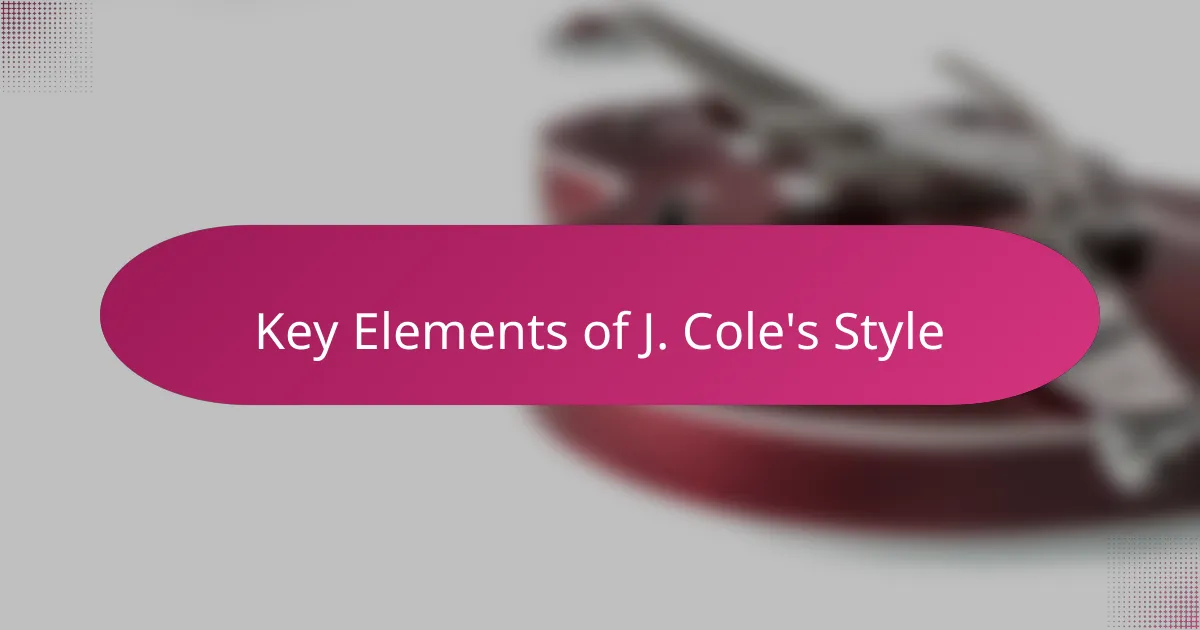
Key Elements of J. Cole’s Style
One thing that immediately struck me about J. Cole’s style is how effortlessly he balances storytelling with introspection. His lyrics often feel like candid journal entries, tackling everything from personal doubts to larger societal issues. Have you ever listened to a track and felt like the artist was speaking directly to your own struggles? That’s the kind of connection Cole creates through his honest, relatable verses.
What really sets J. Cole apart, in my view, is his use of vivid imagery combined with straightforward language. He doesn’t overcomplicate his message; instead, he paints pictures with words that are easy to visualize yet packed with deeper meaning. I remember breaking down a line once that sounded simple at first but revealed layers of cultural critique and self-reflection when I looked closer.
Another key element I noticed is his skillful flow — it’s smooth but deliberate, making each word hit with precision. The way he switches cadence or pauses at just the right moment adds emotional weight to his themes. Would you agree that this kind of rhythmic control turns listening into an immersive experience, rather than just background noise? For me, it’s part of what keeps J. Cole’s music so compelling and thought-provoking.
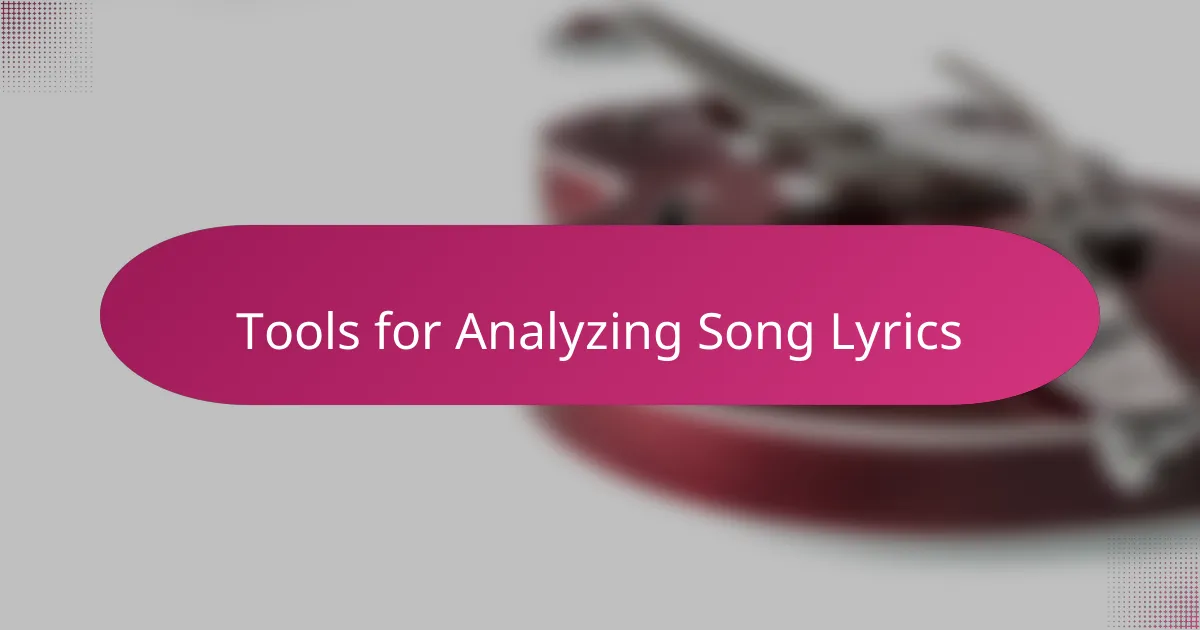
Tools for Analyzing Song Lyrics
When I dove into analyzing J. Cole’s lyrics, I quickly realized that having the right tools makes all the difference. One of my favorites is Genius.com — it’s like a treasure map for lyric lovers. I often find myself checking out the annotations because they reveal hidden meanings and background stories that I’d never guess on my own. Have you tried it before? It really changed how I experience a song.
Beyond online lyric databases, I also rely on simple note-taking apps. Jotting down my interpretations or questions as I listen helps me track recurring themes or patterns in Cole’s work. Sometimes, pausing the track to write a quick thought sparks deeper insights later on. It’s a small habit, but it turned my casual listening into a focused study.
I’ve also found value in using rhyme and metaphor dictionaries when I get stuck on confusing lines. These tools illuminate the artistic choices behind the words, showing me how Cole’s metaphors often carry social and emotional weight. Do you ever feel like a lyric requires another level of decoding? For me, these resources made that challenging process feel more manageable and even fun.
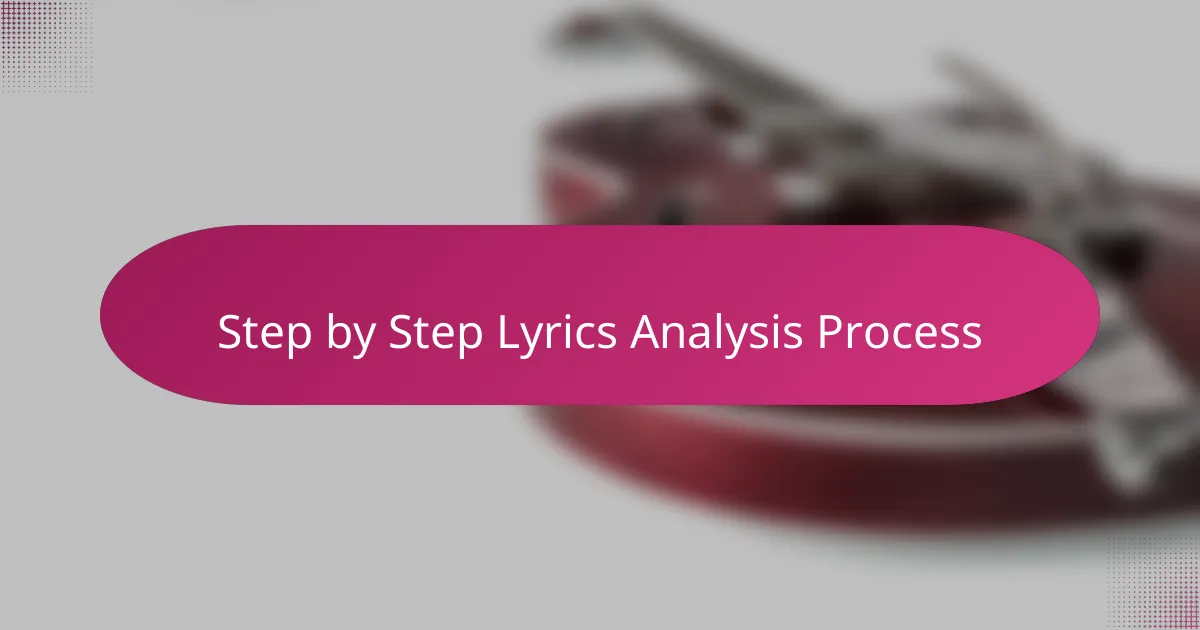
Step by Step Lyrics Analysis Process
The first step I take when analyzing J. Cole’s lyrics is to listen repeatedly, letting the words settle in my mind like pieces of a puzzle. Sometimes, I catch new details on the third or fourth listen that completely change how I interpret a verse. Have you ever had a lyric hit differently after a few plays? That moment of discovery is what keeps me hooked.
Next, I break down the lyrics line by line, paying close attention to the context and any cultural or personal references. I often pause and ask myself why Cole chose certain words or images—what deeper meaning might he be hinting at? This careful dissection helps me move beyond surface-level understanding to uncover the emotions and messages beneath.
Finally, I synthesize all these insights by connecting the dots across the song and even his broader discography. I look for recurring themes or evolving ideas that reveal J. Cole’s growth as an artist and a person. It feels like having a conversation with him through his music, where every lyric is a new chapter to explore. Have you ever tried piecing together an artist’s story this way? It’s a rewarding experience that adds layers to how I appreciate rap music.
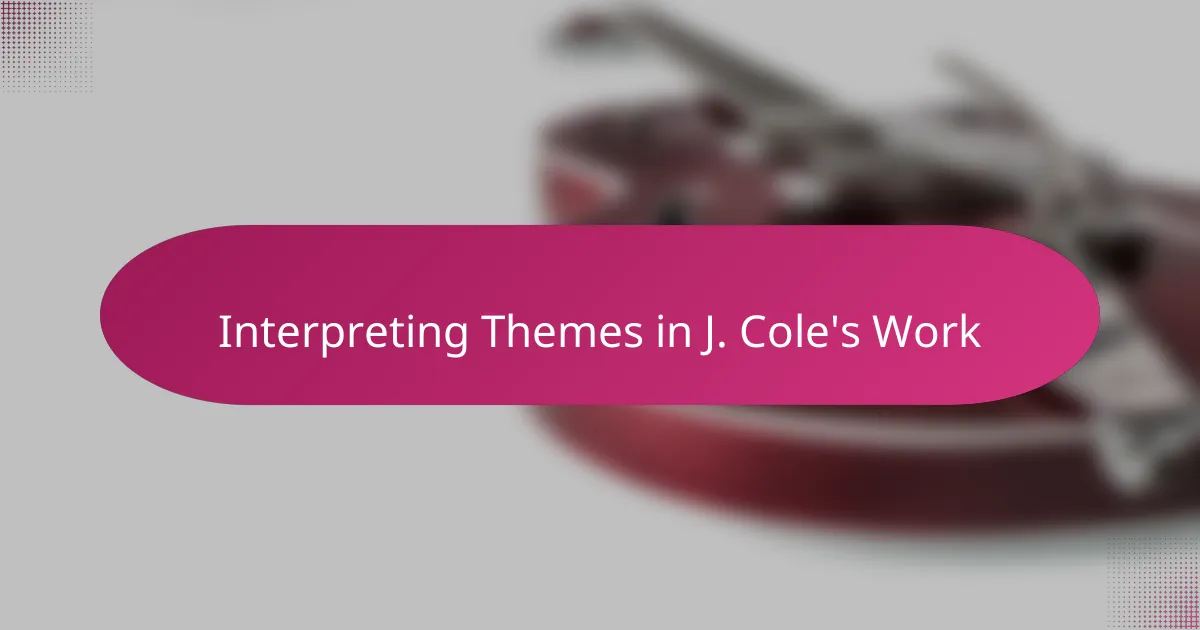
Interpreting Themes in J. Cole’s Work
When I dig into the themes of J. Cole’s work, I’m often struck by how deeply personal and socially aware his lyrics are. He doesn’t shy away from vulnerability, mixing his own doubts and hopes with larger conversations about race, inequality, and growth. It feels like he’s inviting listeners into an honest dialogue rather than just delivering lines for entertainment.
One thing that stands out to me is how J. Cole uses recurring motifs—like dreams, struggles, and redemption—to weave a narrative across his albums. I remember analyzing a song where he juxtaposes ambition with the harsh realities of his upbringing, and it hit me just how carefully crafted these themes are. Do you have a favorite J. Cole lyric that made you pause and think beyond the surface? For me, those moments are where his true power lies.
What’s fascinating is how his themes evolve over time, reflecting changes in his mindset and the world around him. Listening to his earlier work alongside recent tracks, I noticed a shift from raw frustration to a more nuanced hopefulness. This progression makes each new song feel like a chapter in his ongoing story, and it’s rewarding to watch that growth through his lyrics. Have you noticed something similar in his evolution? It’s moments like these that keep me coming back to re-examine his words with fresh ears.

How I Applied Analysis Techniques
I started by applying close reading techniques, treating each line like a small puzzle to solve. Sometimes, I’d pause and ask myself why J. Cole chose a specific word or metaphor, and those moments often unlocked deeper layers of meaning I hadn’t noticed before. Have you ever felt the same curiosity spark while listening to a song?
To keep track of my thoughts, I made it a habit to jot down interpretations and questions as I listened. This simple practice transformed my experience from passive listening into an active dialogue with the lyrics. It became clear that analyzing isn’t just about finding what’s obvious but about uncovering the subtle connections that tie the song’s story together.
I also experimented with comparing different verses and tracks to spot recurring themes or shifts in tone. This step felt like piecing together a larger narrative, revealing how J. Cole expresses growth and self-reflection over time. Have you noticed how revisiting an artist’s work can deepen your appreciation in unexpected ways? For me, it’s like discovering hidden chapters in a favorite book.
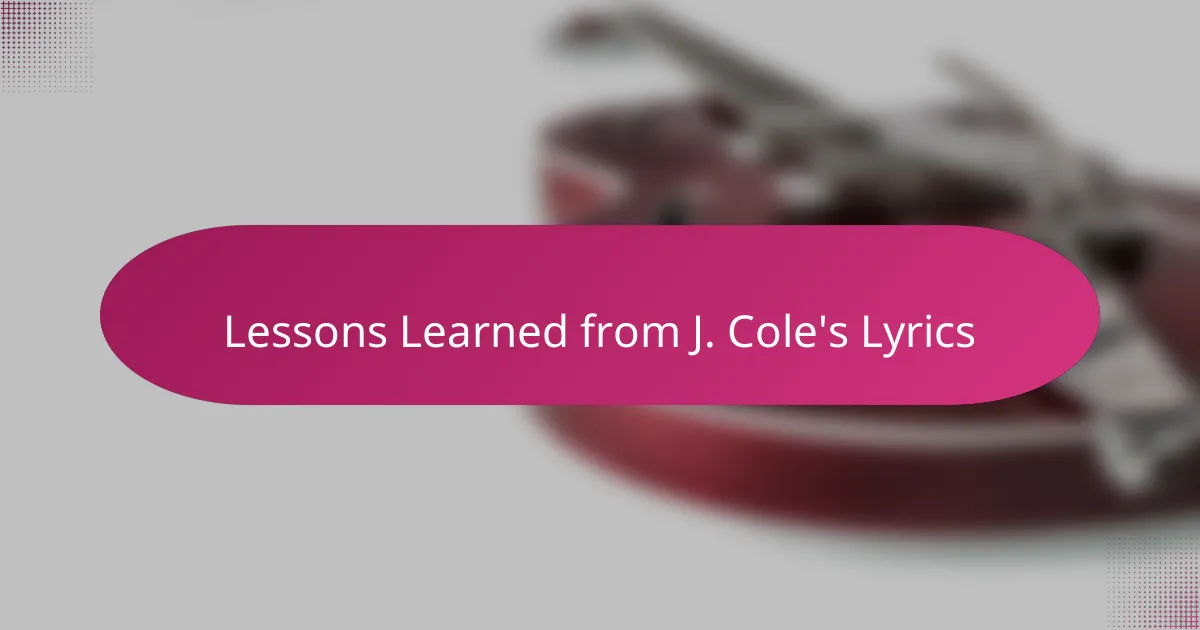
Lessons Learned from J. Cole’s Lyrics
One of the biggest lessons I’ve learned from J. Cole’s lyrics is the power of vulnerability. When he opens up about his fears and imperfections, it doesn’t just make his music relatable—it reminds me that honesty can be a strength, especially in a genre where bravado often dominates. Have you ever caught yourself reflecting on your own struggles after hearing an artist lay themselves bare like that? For me, those moments create a rare kind of connection that goes beyond the music.
Another important takeaway is how J. Cole masterfully ties personal stories to broader social issues without ever sounding preachy. That balance taught me that rappers can be both storytellers and commentators, sparking thought without sacrificing authenticity. I found myself wanting to dig deeper into issues like inequality or mental health because his lyrics framed them through real, lived experience—not just headlines.
Lastly, J. Cole’s work showed me the value of patience and repeated listening. Sometimes, a line that seemed simple at first slowly reveals layers of meaning over time, like a hidden message unfolding only after reflection. Have you ever had a lyric that stayed with you, growing in significance the more you revisited it? That evolving understanding transformed the way I engage with all music, making each listen feel fresh and full of discovery.
